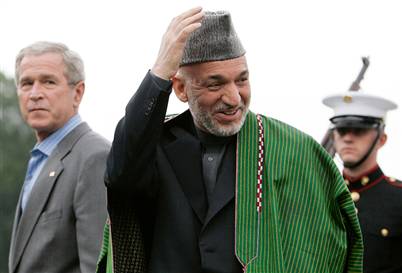Karzai sees no gains in bin Laden hunt
(AP)Updated: 2007-08-06 06:21 WASHINGTON - In the hunt for Osama bin Laden, the United States and its allies have essentially gotten nowhere lately, says Afghan President Hamid Karzai.
"We are not closer, we are not further away from it," Karzai said ahead of his two-day summit with President Bush at Camp David, Md. "We are where we were a few years ago."
Karzai ruled out that bin Laden was in Afghanistan, but otherwise said he didn't know where the leader of the al-Qaida terror network was likely hiding. Karzai's comments, in an interview on CNN's "Late Edition," were taped Saturday in Kabul and broadcast Sunday.
|
Aghanistan President Hamid Karzai, center, arrives at Camp David on Sunday for a two-day visit with President Bush.[AP] |
Karzai arrived at Camp David in the late afternoon greeted by Bush and first lady Laura Bush. The president did a 360-degree spin in a golf cart for the assembled media and drove the three of them away.
The Afghan leader's visit comes as he faces competing troubles at home гн civilian killings, surging opium production and steady violence.
All of those matters are expected to be discussed with Bush.
Afghanistan's fragility remains of paramount concern to the United States. Bush is expected to prod Karzai on how his government can exert гн and extend гн its authority.
"Karzai wants to shore up his ties in Washington," said Teresita Schaffer, a former top State Department official for south Asia. "And I think the U.S. government very much wants to get a stronger sense of how we can develop a common political strategy."
Despite its progress since U.S.-led forces toppled the militant Taliban regime in 2001, Afghanistan still is dominated by poverty and lawlessness. Stability has been hindered by the lack of government order, particularly in the southern part of the country.
"The security situation in Afghanistan over the past two years has definitely deteriorated," Karzai said in the interview. "There is no doubt about that."
Overshadowing the Bush-Karzai meeting is the fate of 21 South Korean volunteers who were abducted by the Taliban on July 19 and are now believed to be in central Afghanistan. The captors took a total of 23 people hostage and have shot and killed two of them.
The Taliban is seeking the release of prisoners; the Afghan government has refused, and the U.S. adamantly opposes conceding to such demands. The crisis has put considerable pressure on Karzai and raised more doubts about his ability to enforce the rule of law.
Bush and Karzai are also likely to discuss Afghanistan's distrustful relationship with neighboring Pakistan. Karzai said the flow of foreign fighters from Pakistan into his country is a concern he will address soon with Pakistani President Pervez Musharraf.
The two are expected to meet this month as part of a gathering of tribal elders in Kabul.
Karzai said he is investigating reports that Iran is fueling violence in Afghanistan by sending in weaponry such as sophisticated roadside bombs. Yet he also praised Iran as a partner in peace and against narcotics. "So far, Iran has been a helper," he said.
On another front, Afghanistan now accounts for 95 percent of the world's poppy production used to make heroin and profits from the drug trafficking have helped the Taliban.
Violence has been rising sharply in Afghanistan, led by different Taliban groups with various links to tribal leaders and residual al-Qaida forces.
As U.S. and NATO forces target Taliban insurgents, the civilian deaths associated with the attacks have enraged the Afghan population and eroded Karzai's authority. He has repeatedly asked military commanders for more caution and lashed out at foreign forces aiding his nation.
Karzai is likely to seek some reassurance from Bush that "whatever the U.S. is doing is going to result in fewer civilians killed," said Schaffer, now the director of the South Asia program at the Center for Strategic and International Studies.
Militants often wear civilian dress and seek shelter in villagers' homes, making it hard to differentiate the enemy from the innocent. Bush "is absolutely satisfied" that the U.S. military is doing all it can avoid civilian casualties, spokesman Scott Stanzel said.
|
|
|
||
|
||
|
|
